Tweaking the Record
On November 7, a Chinese regional court in Hebei Province convicted nine individuals for manufacturing and trafficking fentanyl and other controlled synthetic drugs. Mandarin-language reporting on the case indicates the individuals were affiliated with two chemical companies: Tang Shen Biological Technology Company and Milin Biological Technology Company. These two companies have been previously referred to as entities within the so-called Diana Drug Trafficking Organization (DTO). Using open-source research methodologies, including investigating phone numbers, e-mail addresses, and social media accounts, C4ADS built out the larger networks behind these synthetic drug sales, finding that Tang Shen and Milin appear to have functioned as brokers in the fentanyl trafficking supply chain, while other unreported companies may have produced the illicit drugs.
Tweaking the Record: Mapping a Chinese Fentanyl Network #
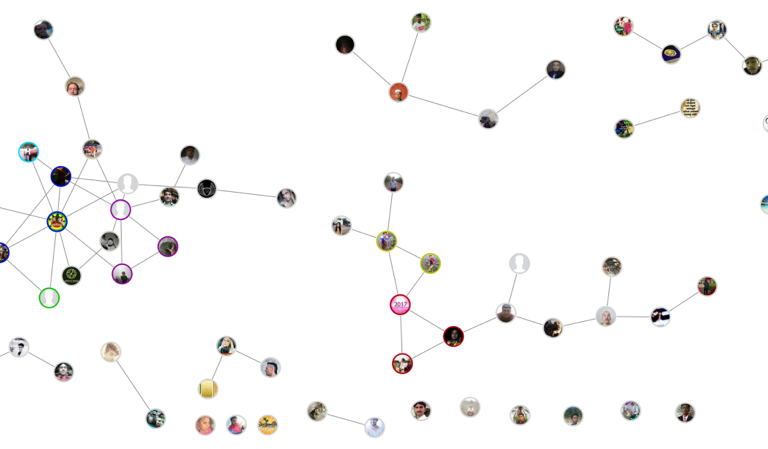
On November 7, 2019, a Chinese regional court in Hebei Province convicted nine individuals for manufacturing and trafficking fentanyl and other controlled synthetic drugs. Mandarin-language reporting on the case indicates affiliations between the individuals and two chemical companies: Tang Shen Biological Technology Company and Milin Biological Technology Company. These two companies have been attributed in reports to the Diana Drug Trafficking Organization (“DTO”), since both had salespeople named “Diana.” Using publicly available information (PAI) research methodologies, including investigating phone numbers, e-mail addresses, and social media accounts, C4ADS built out the larger networks behind these synthetic drug sales, finding that Tang Shen and Milin appear to have functioned as brokers in the fentanyl trafficking supply chain, while other unreported companies may have produced the illicit drugs.
Chinese Reporting on the Diana DTO #
Beginning in November 2017, Chinese police arrested individuals with suspected affiliations to a drug trafficking ring believed to be shipping fentanyl and other synthetic drugs to the United States. Ultimately, nine individuals affiliated with the Diana DTO were convicted on drug charges, marking the first public case of US and Chinese law enforcement collaborating to shut down an international fentanyl trafficking network.
According to the November 7, 2019 sentencing documents, three Chinese individuals were named as the main defendants: Liu Yong (刘勇), Jiang Juhua (蒋菊花), and Wang Fengxi (王凤玺). Liu Yong, allegedly the drug manufacturer, was sentenced to death, with a two-year reprieve. Jiang Juhua, allegedly an online synthetic drugs salesperson, was sentenced to life in prison. Wang Fengxi, allegedly a broker who sourced products from manufacturers, was also sentenced to life in prison.
Based on Chinese reporting surrounding the arrests, C4ADS can build a picture of how these individuals may have collaborated together within the Diana DTO.
According to the Beijing News, Liu Yong lived in Shanghai and Changzhou working in organic chemistry labs for more than 10 years. In January 2016, he reportedly opened his own company, Shanghai Jingying Chemical Technology Co., LTD (上海菁樱化工科技有限公司). Around the same time, Liu Yong began communicating with Jiang Juhua over QQ, a Chinese social media app, and reportedly supplying her with pharmaceutical compounds. Reports indicate that around August 2017, Liu Yong first supplied Jiang Juhua with fentanyl.
The Beijing News further reported that, in 2016, Jiang Juhua, under the names “Li Hai” and “Leji Biotech,” began selling illicit drugs on Wechat and QQ. According to reports, Jiang describes her role as that of a broker liaising between manufacturers, distributors, and clients. Chinese media reports have indicated that Jiang Juhua served as a broker between Liu Yong and Wang Fengxi.
Chinese reporting further claims that Wang Fengxi co-founded Tang Shen & Milin to sell fentanyl, alprazolam, ketamine, and other synthetic drugs. He reportedly enlisted the help of Jiang Juhua to procure fentanyl that he then sold to global customers.
With this background, C4ADS analyzed the corporate presence of the individuals and companies detailed above. Typically, this process would begin by searching for known companies in the Chinese corporate registry. From these registration documents, connections between companies, their shareholders, and management structure can be built out into their component corporate networks.
However, this traditional methodology does not work for the Diana DTO because the companies as named in arrest reports and existing literature do not appear in the mainland China corporate registry. Instead, C4ADS identified online activity for Hebei Tang Shen Biological Technology Company LTD (河北汤神生物科技有限公司) and Hebei Milin Biological Technology Company LTD (河北米林生物科技有限公司) on online marketplaces, social media platforms, and e-commerce websites. Based on these findings, we looked for other entities potentially affiliated with the Diana DTO beyond what was previously reported, including companies legitimately registered in the mainland China corporate registry.
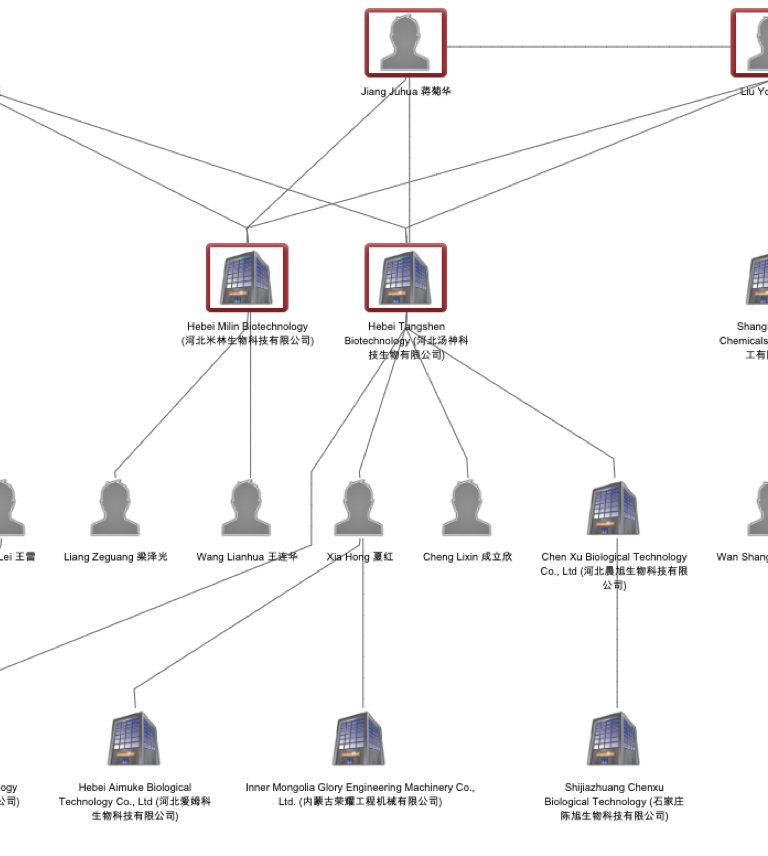
Finding Connections: Chen Xu Biological Technology Co., LTD #
Tang Shen and Milin both ran online profiles easily accessible on the open web that advertised fentanyl and other synthetic drugs. For example, a profile for Tang Shen on VVChem.com, an online chemical marketplace, uses the company e-mail address [email protected]. The URL “biology-chem.com” is no longer active, but was historically used by two companies: Tang Shen Biological Technology Co., LTD and Chen Xu Biological Technology Co., LTD. The screenshots below show historical caches of “biology-chem.com.”
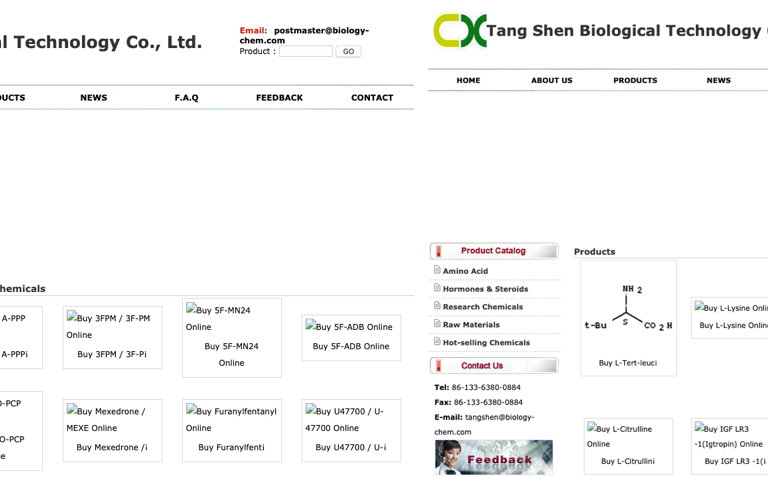
These archived webpages are stored in Wayback Machine and were captured in 2016 and 2018, respectively. The screenshot on the left shows that the URL “biology-chem.com” was connected to Chen Xu Biological Technology Co., LTD. Similarly, the screenshot on the right corroborates that the website was affiliated with another company named Tang Shen Biological Technology Co., LTD. Both pages advertised nearly the same fentanyl analogues and synthetic drug products. Given that domain registration information did not change between the two website versions above, one likely conclusion is that Chen Xu is an alias of Tang Shen.
Finding Connections: Hebei Lanyu Biotechnology Co., LTD #
Corporate Identifiers tied to online profiles for Tang Shen and Milin can be used to build connections to other companies and individuals found in the Chinese corporate registry. For example, on the website China.cn, a Chinese e-commerce platform, the phone number on Tang Shen Biological Technology’s profile (+86-133-63800884) is also tied to another synthetic drug supply company that has marketed fentanyl and synthetic drugs: Hebei Lanyu Biotechnology Co., LTD (河北蓝宇生物科技有限公司). Hebei Lanyu was dissolved in May 2016. However, prior to its closure, Hebei Lanyu was affiliated with an individual named Wang Fengxi in connection to a March 2016 liquidation filing. Given that this individual has the same Chinese name as the trafficker sentenced to life in prison, it is likely that this is the same Wang Fengxi implicated in the Diana DTO sentencing.
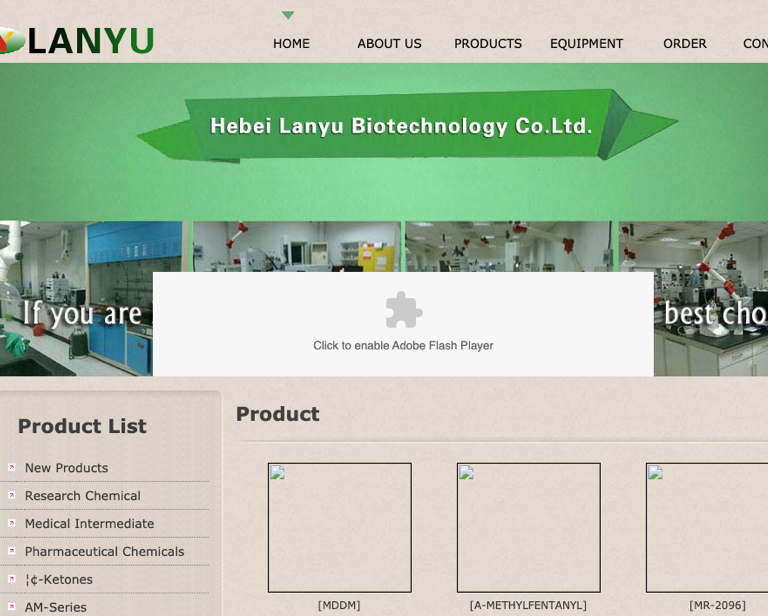
Wang Fengxi and another individual from Hebei Lanyu’s registry, Wang Yanbin (王彦彬), are also registered to another company in the Chinese corporate registry: Xingtai Heyu Trading Company, LTD (邢台和裕贸易有限公司). A cached company profile on the Chinese online marketplace, 企业梦工厂 (qymgc.com), describes their scope of business as: “[mainly] engaged in the sales of bicycles and accessories, tricycles and accessories, baby carriages and accessories.” C4ADS has previously identified other Chinese illicit fentanyl networks, specifically in Xingtai, that advertise children’s bicycles and toy cars.
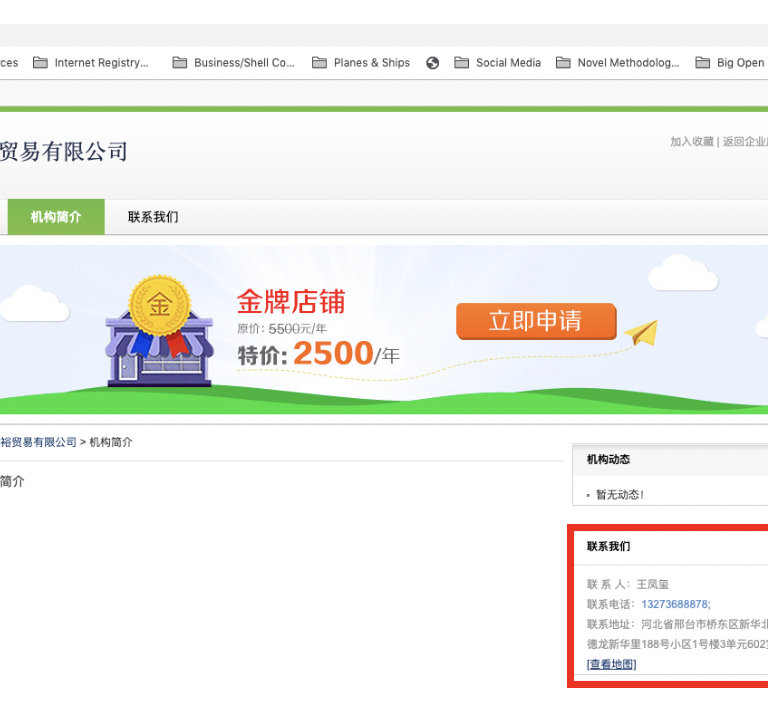
Another profile on the trade website 54114.cn includes additional identifiers that connect Xingtai Heyu to the registered company for Tang Shen, Hebei Tang Shen Biological Technology Company, LTD. The phone number seen on Xingtai Heyu’s profile above (13273688878) matches the phone number included on Hebei Tang Shen’s corporate registry filing. Additionally, the address included in the image above also matches that of Hebei Lanyu. Given the shared registered phone number and physical address, it is likely that these three companies are connected. While Hebei Lanyu was dissolved on May 15, 2016, Xingtai Heyu and Hebei Tang Shen remain in operation, according to corporate registration information.
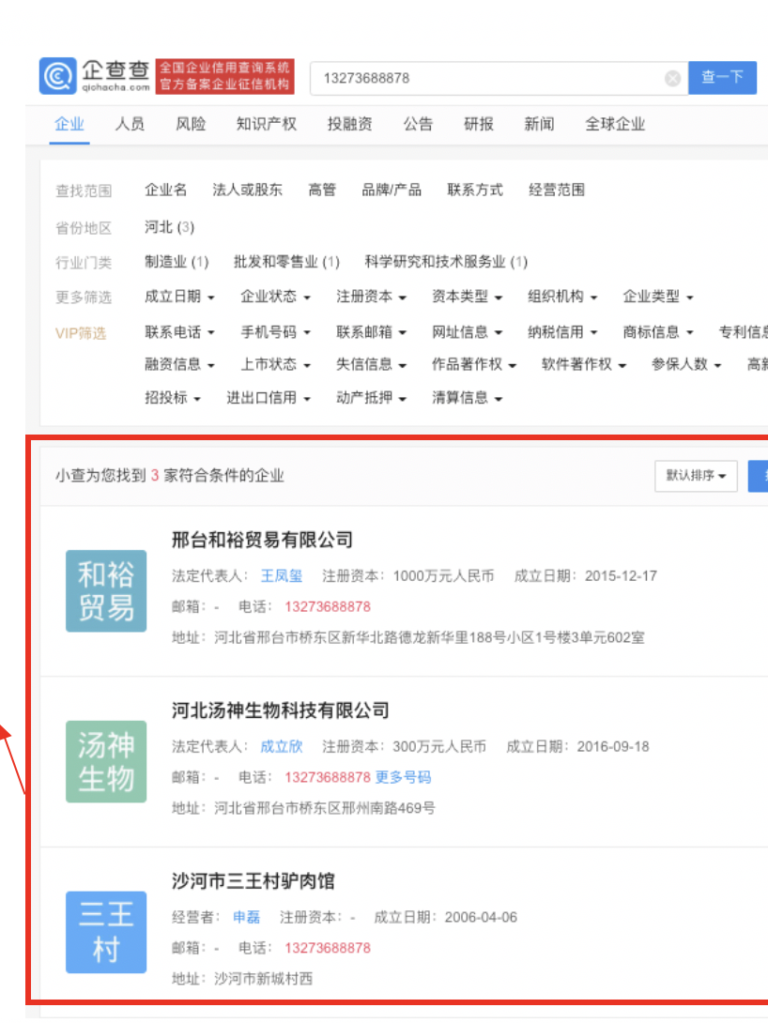
The mainland Chinese corporate registry corroborates Liu Yong’s affiliation to Shanghai Jingying Chemical Technology, as Liu Yong is registered as the company’s legal representative. He is also registered to another company, Shanghai Tuzhi Chemical Company Limited (上海途志化工有限公司). Both of these companies had an individual named Xu Genguo (徐根国) as a former legal representative, but he was taken off both corporate records on September 11, 2017. This date aligns closely with the original November 2017 arrest of the Diana DTO. Tuzhi Chemical still lists 277 different chemicals on Molbase.cn, a Chinese chemical trade website.
Identifying Activity On Social Media #
Tang Shen and Milin also blatantly posted drug advertisements on social media, none of which were included in arrest or sentencing reports. These accounts are easily accessible when searching for the website domains affiliated with both companies, biology-chem.com and hbmilin.com, respectively. Doing so on Facebook and Twitter nets the following search results:
- Hebei Milin advertising carfentanil, fentanyl analogues, and other drugs on Facebook and Twitter.
- Three Facebook profiles for Hebei Tang Shen (1, 2, 3) advertising fentanyl analogues and other drugs.
A profile attributed to “Juli Baker” can be seen advertising illicit chemical products for Tang Shen Biological Technology on Facebook. The two first posts show the following advertisements:
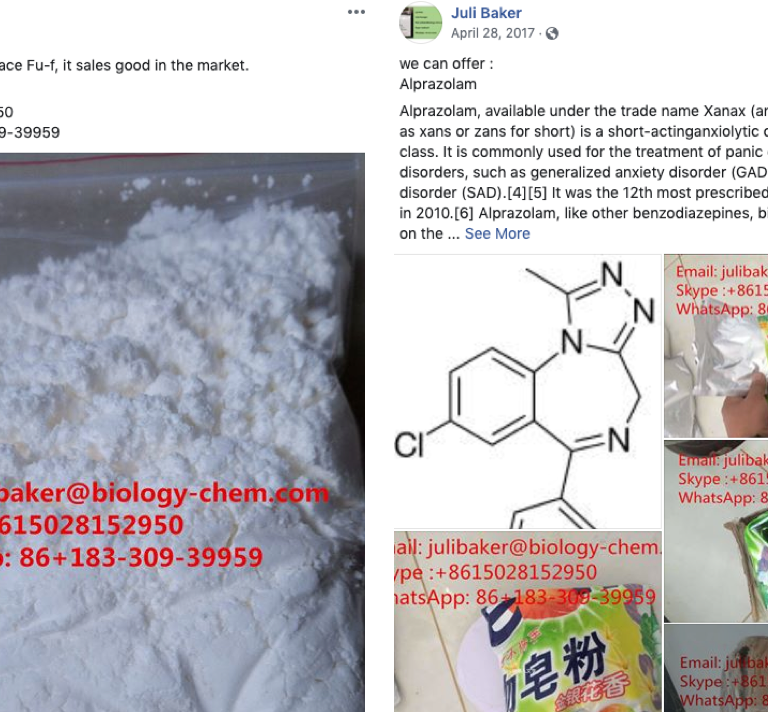
The post on the left offers “Buff,” which is described as a replacement for “Fu-f.” Buff is the common acronym for butyrfentanyl, which is one of the most popular fentanyl analogues; Fu-f is an acronym for furanylfentanyl, also very popular. The post on the right offers Alprazolam, another drug included in the sentencing and arrest documents, including an example of how drugs would be packaged: in a mylar bag placed inside a laundry detergent package.
Social media accounts also demonstrate interconnectivity between other users in the same network. The following is a visualization of the Facebook friends network of Juli Baker.
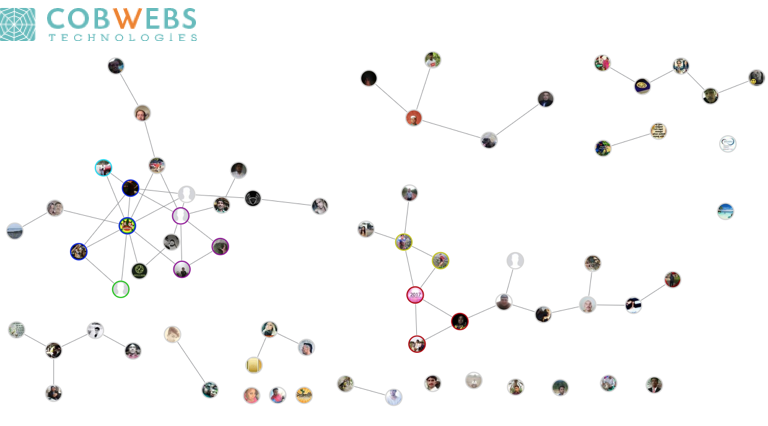
This connectivity mapping illuminates that, at minimum, a Facebook profile associated with Tang Shen and Milin were connected with multiple other profiles. Friends in Juli Baker’s network are also in some cases interconnected with other friends, demonstrating a relationship between users in the same network. This interconnectivity is commonly seen in drug trafficking social networks, most likely because prospective purchasers can use word-of-mouth communication to vet reliable drug vendors. In this case, interconnected friends are able to discuss whether or not they actually received their product, recommend other drug sellers, and create robust groups and networks based on evidence and trust. These Facebook friends self-attribute their locations as the United States, England, Australia, Pakistan, and more.
Takeaways #
Ultimately, by starting with Tang Shen’s publicly available identifiers, uncovering multiple, previously unreported companies that may have been affiliated with the Diana DTO is possible. Research by C4ADS has found that illicit fentanyl supply chains often rely on a network of unlisted affiliations between manufacturing and production companies, brokers, and import and export companies. The methodological approaches outlined above can be used to reveal these potential connections in both Chinese and international drug trafficking networks more broadly.
For instance, the company Hebei Lanyu Biotechnology Co., LTD appears to have also advertised fentanyl and other illicit synthetic drugs online, and is tied to the Wang Fengxi included in sentencing documents. More connections in this illicit network likely exist, but such information has been excluded from arrest and sentencing reports.
Yet, by analyzing connections found in publicly available information, it is possible to begin mapping illicit networks more broadly and gain crucial insights into the larger systems that facilitate international drug trafficking and how to disrupt them






